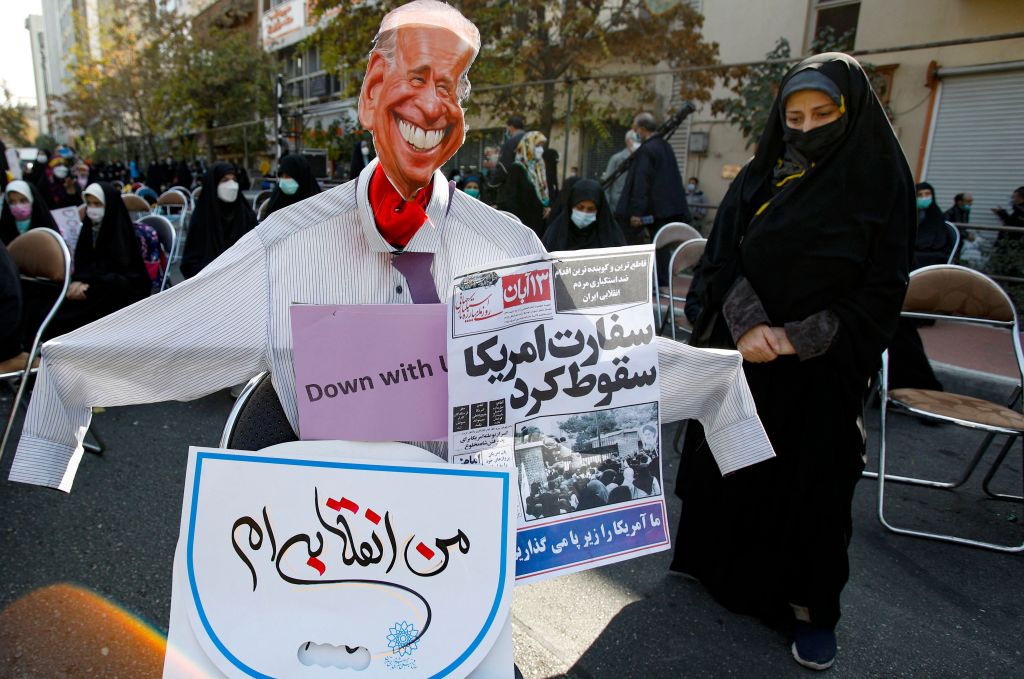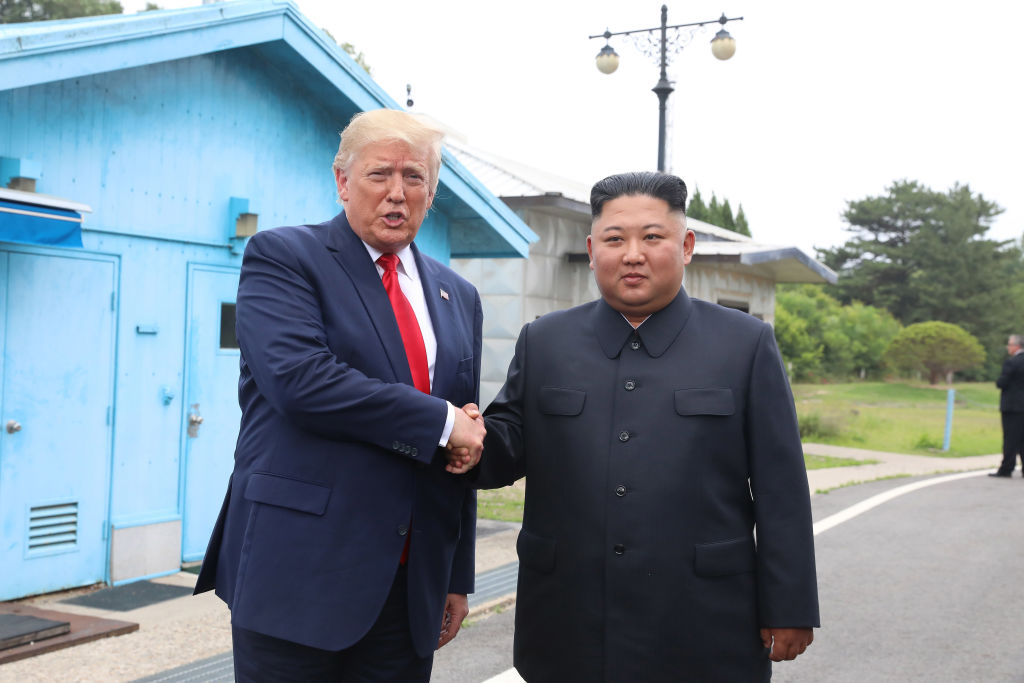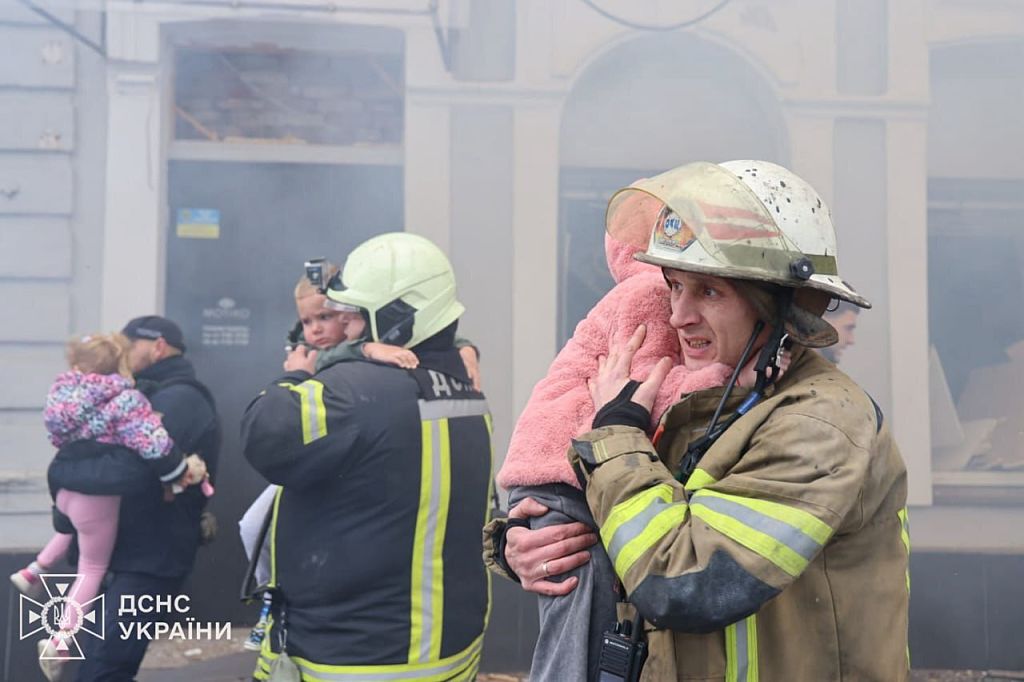We were promised a war of nerves in Vienna between Washington and Tehran, a game of chicken. Instead, President Biden has chickened out. He’s also blaming Israel. Call it fowl play.
Here’s how it should be going. The United States wants Iran to re-commit to refreezing its nuclear program. Iran demands in exchange the revoking of the economic sanctions against it. Each side insists that it won’t give up on its demands — even if that could lead to the collapse of the negotiations, the demise of the Joint Comprehensive Plan of Action (JCPOA) and eventually to a military confrontation.
The diplomatic and military tensions between the United States and Russia over Ukraine involve just such an exercise in brinkmanship. Western intelligence sources leak to the media that Russian forces are operating beyond the Ukrainian border and warn of a possible invasion. The Russians describe these reports as “alarmist” and threaten to take “adequate response measures” in response to “unfriendly steps” such as the crossing of “red lines.” The United States and its Western allies say they are committed to defending Ukraine and threaten “strong economic and other measures.”
The bottom line is that the United States and NATO are hanging tough on Ukraine, depicting Russian President Vladimir Putin as the aggressor and leaking a lot of dirt about him to the media — while portraying the corrupt elites of Ukraine as Jeffersonian democrats trying to defend their nation. And, of course, Washington is ready to make Moscow pay a high price for its actions, even if that raises the likelihood of political and military escalation.
And then there are the echoes of “Munich”: of Nazi aggression, a defenseless Czechoslovakia and appeasement, and the notion that this scenario would recur this time in Ukraine, and that Washington would be forced to “do something” if the Russians don’t back off.
Compare that tough American stand on Russia to the administration’s posture vis-à-vis Iran: it’s diplomacy verging on appeasement. Chamberlain was a chicken. But Biden is not. In the famous “chicken” sequence in Rebel Without a Cause, it’s James Dean’s character, Jim, who survives while his rival, Buzz, plunges to his death. In the Iran scenario, Jim jumps from his car before reaching the edge of the cliff: he’s a chicken.
But first, we need to ask ourselves why Jim is even wasting time in a race with Buzz.
To put it differently, the race is already over. The Iranians have already won before entering into the talks in Vienna. As General Kenneth McKenzie Jr. who heads US military operations across the Middle East and South Asia, explained to Robin Wright of the New Yorker recently, Iran’s arsenal of missiles has become a “more immediate threat than its nuclear program.”
Indeed, since the signing of the 2015 nuclear deal, the Iranians have developed the largest and most diverse missile force in the Middle East, including missiles with longer reach, precision accuracy and greater destructive power. As General McKenzie describes it, the Iranians can now “strike effectively” and with accuracy and volume “across the breadth and depth of the Middle East” with thousands of ballistic missiles that could reach India, China, Russia and parts of Europe, not to mention Israel and Saudi Arabia.
In 2019, Iran unleashed cruise missiles and drones at two Saudi oil installations, cutting off half of the country’s oil production. The Trump administration failed then to respond to an act of aggression that could have potentially shaken up the global energy market and altered the geostrategic and geo-economic balance of power. Killing the Iranian general Qassem Soleimani didn’t change the reality. What it changed was Iran demonstrating that it could devastate Saudi Arabia, an American ally that accounts for more than 12 percent of the share of the world’s total oil reserves, without the United States moving a finger.
Add to that the growing military threats posed by Iran’s proxies in the Middle East, and the question that should be asked is: why are the current negotiations in Vienna focusing exclusively on Iran’s nuclear program? When its ballistic missiles program, considered to be more advanced than Pakistan’s, and its regional bloc of allies pose a much more immediate threat not only to Israel and Saudi Arabia but also to the United States and its European allies?
To employ the Munich analogy, it’s as though Britain and France demanded in 1939, after Hitler had already invaded half of Poland, that Germany re-commit itself to the 1937 agreement and withdraw its troops from…Prague.
If anything, the Biden administration has been taking steps to placate Iran and the members of its so-called “axis of resistance” in the name of “diplomacy.” In one of his first diplomatic decisions, President Biden, responding to the pressure from the progressive wing of his party — always ready to appease one of the world’s enemies of progress, the Islamic Republic — announced that the US military will no longer assist the Saudi-led coalition battling the pro-Iran Houthi rebel forces in Yemen.
Guess how the Iranians responded to this gesture of goodwill by Washington? They have continued to arm the Houthi rebels, who in turn have made some significant territorial gains in Marib, a resource-rich province, and now threaten to take control of the country’s north. Yemeni security employees of the US government have been detained in Sanaa, the Yemeni capital, after the compound that once housed the American embassy was breached by Iran-backed Houthi forces.
At the same time, Iran-backed militias in Iraq have carried out drone strikes on sensitive American targets. According to news reports, these militias have used explosive drones that dive-bomb US bases. In July, pro-Iran militias fired fourteen rockets that landed on the base housing US and allied troops in western Iraq. In October the Iranians launched a drone attack on al-Tanf, a military base in Syria housing 200 Americans. And in November, pro-Iran militias used drones to try to kill the Iraqi prime minister, Mustafa al-Kadhimi, an ally of Washington.
The Biden administration has refrained from taking any military retaliatory actions against this Iranian aggression that could amount to an act of war. It wants to avoid a military confrontation with Iran at a time when it is betting on the success of the negotiations in Vienna. Instead, Washington has turned its diplomatic guns against the real culprit…Israel.
Earlier in the year, the administration compelled the Israelis to end their Gaza military operations against Hamas, one of Iran’s proxies, as Democratic progressives bashed Israel’s war of defense against the criminal Islamist group as “war crimes.”
More recently, as part of an effort to demonstrate to the Iranians that they would be able to “control” Israel if Tehran returned to the 2015 accord, Biden administration officials have provided the New York Times with a series of exclusives that suggested Israeli attacks against the Iranian nuclear program were counterproductive and have enabled Tehran to rebuild an even more efficient enrichment program; warned of growing tensions between Washington and Israel over the negotiations in Vienna; and refused an Israeli request to fast-track the delivery of tanker aircraft that would be essential to striking Iran’s nuclear sites.
It’s as though Jim in Rebel Without a Cause has chickened out and decided to throw the race. Buzz has already won.

























